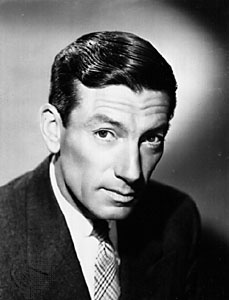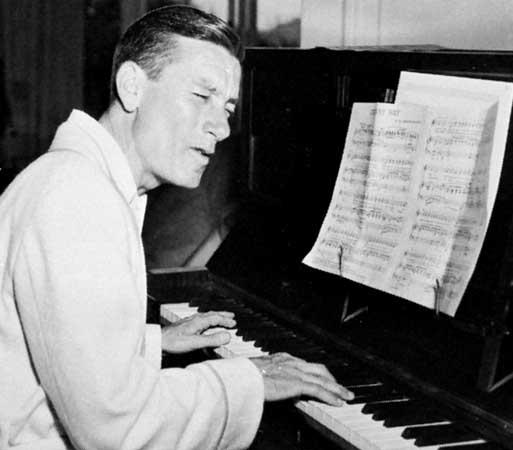Carmichael, Hoagy
American composer, musician, and actor
byname of Hoagland Howard Carmichael
born November 22, 1899, Bloomington, Indiana, U.S.
died December 27, 1981, Rancho Mirage, California
 American composer, singer, self-taught pianist, and actor who wrote several of the most highly regarded popular standards in American music.
American composer, singer, self-taught pianist, and actor who wrote several of the most highly regarded popular standards in American music.Carmichael's father was an itinerant electrician, and his mother earned extra money for the family as a pianist for dances and silent movies; from her, Carmichael absorbed the basics of playing the piano. He was strongly influenced by ragtime music and by the music he heard from black families and churches in his neighbourhood. As a teenager, he made every effort to hear and play as much jazz as possible, studying in Indianapolis, Indiana, with pianist Reginald DuValle and traveling to Chicago to hear Louis Armstrong (Armstrong, Louis). While studying at Indiana University in Bloomington (LL.B., 1926), Carmichael led a small jazz band that had some success playing for college dances throughout the Midwest. In the spring of 1924, Carmichael became friends with Bix Beiderbecke (Beiderbecke, Bix) after engaging the young cornetist to play for several fraternity parties. Carmichael's first composition, "Free Wheeling," was retitled "Riverboat Shuffle" when recorded by Beiderbecke and his band, the Wolverines, later the same year; the recording subsequently became a jazz classic.
 After graduating from college, Carmichael practiced law in Florida for a brief period. During this time, he happened to hear a recording of his song "Washboard Blues," by Red Nichols and his Five Pennies. Surprised that the song had been recorded and encouraged by this mark of success, he abandoned law and moved to New York City to embark on a career as a musician and composer. He recorded a version of his song "Stardust" in 1927; the song, an instrumental until fitted with lyrics by Mitchell Parrish in 1929, attracted little notice at first. In 1930 Isham Jones and his Orchestra had a hit with the song, and it went on to become one of the most renowned and most recorded standards in all of American music. During his stay in New York, Carmichael became friends with the young lyricist Johnny Mercer (Mercer, Johnny); the two collaborated on several songs throughout the years, with "Lazy Bones" being their first hit in 1933. Other hits composed during Carmichael's years in New York include "Lazy River," "Rockin' Chair," and "Georgia" (also known as "Georgia on My Mind" ).
After graduating from college, Carmichael practiced law in Florida for a brief period. During this time, he happened to hear a recording of his song "Washboard Blues," by Red Nichols and his Five Pennies. Surprised that the song had been recorded and encouraged by this mark of success, he abandoned law and moved to New York City to embark on a career as a musician and composer. He recorded a version of his song "Stardust" in 1927; the song, an instrumental until fitted with lyrics by Mitchell Parrish in 1929, attracted little notice at first. In 1930 Isham Jones and his Orchestra had a hit with the song, and it went on to become one of the most renowned and most recorded standards in all of American music. During his stay in New York, Carmichael became friends with the young lyricist Johnny Mercer (Mercer, Johnny); the two collaborated on several songs throughout the years, with "Lazy Bones" being their first hit in 1933. Other hits composed during Carmichael's years in New York include "Lazy River," "Rockin' Chair," and "Georgia" (also known as "Georgia on My Mind" ).Carmichael moved to Hollywood, California, in 1936. There he composed songs for films and found additional success as a character actor, often playing the role of a philosophical and world-weary piano player, as in To Have and Have Not (1944). His hit songs for movies include "Two Sleepy People," "Small Fry," "Heart and Soul," "Ole Buttermilk Sky," "The Nearness of You," and "In the Cool, Cool, Cool of the Evening," which won an Oscar for the best film song of 1951. One of his best-known compositions of the 1940s was "Skylark," another collaboration with Mercer, and a song that reflected Carmichael's jazz influences in that, according to one music scholar, it “seemed to have the improvisations built right into the melody.”
As the golden age of American popular song waned during the advent of rock and roll in the 1950s, Carmichael continued to write songs—including such minor hits as "My Resistance Is Low" and "Winter Moon" —but had no more major successes as a songwriter. He also acted in a variety of television roles, such as his recurring dramatic part on the western series Laramie during the 1959–60 season. He never stopped composing, although most of his later songs were never recorded. One notable exception was a collection of children's music released in 1971, Hoagy Carmichael's Music Shop. Mostly, he devoted his later years to his hobbies of golf and coin collecting.
Carmichael wrote two well-received volumes of memoirs, The Stardust Road (1946) and Sometimes I Wonder (1965). After Carmichael's death, his family donated his archives and personal effects to his alma mater, Indiana University, which opened the Hoagy Carmichael Room in his honour in 1986.
- oculus
- O'Curry, Eugene
- Odaenathus, Septimius
- O Dalaigh, Cearbhall
- Oda Nobunaga
- Odantapurī
- Odawara
- Odd Hassel
- ode
- O'Dea, Pat
- Odell, Jonathan
- Odendaalsrus
- Odense
- Odenwald
- Oder River
- Oder–Havel Canal
- Oder–Neisse Line
- Odessa
- Odessa Meteor Crater
- Odets, Clifford
- Odetta
- odeum
- Odienné
- Odilon Barrot
- Odilon Redon